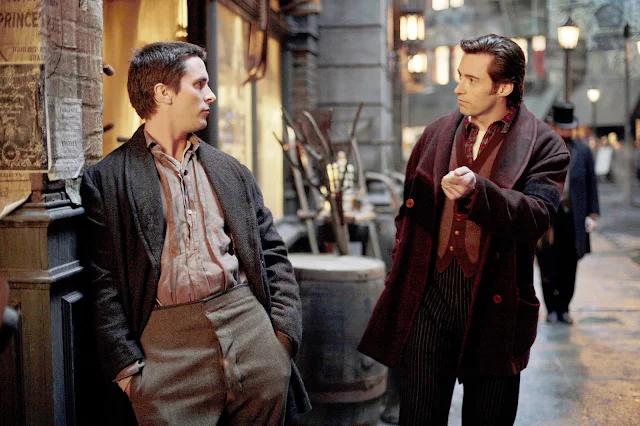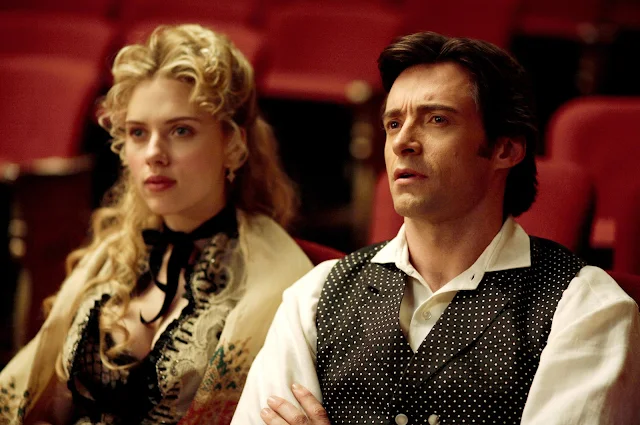This article contains massive spoilers.
You have been warned.
"The Prestige," directed by Christopher Nolan (Tenent, Inception), delves into the captivating world of illusion and deception, unraveling the intricacies of the rivalry between two magicians. At its core, the film examines how the pursuit of perfection and the lengths one is willing to go can lead to the sacrifice of ethics, relationships, and even one's own identity.
The relationship between Alfred and Fallon is a unique dynamic that sets the foundation for their illusionist act. The bond between the two brothers is both deep and symbiotic. Their unity enables them to perform the breathtaking "Transported Man" trick, where one twin appears to instantly teleport from one part of the stage to another. The seamless execution of this trick depends on their inherent connection and shared secrets, highlighting the strength of their twin bond.
Offstage, the dual identity complicates Borden's personal life. The secrecy surrounding his twin brother affects his relationships, as seen in his strained marriage with Sarah. Borden's commitment to his act, at times, makes him distant and emotionally unavailable, emphasizing the internal struggle between his passion for magic and his yearning for meaningful connections.
The dual identity also fuels the rivalry with Robert Angier. Angier's inability to understand how Borden achieves his tricks spurs on their competition, exemplifying the theme of obsession and the consequences it brings. Borden's dual identity symbolizes the lengths he and Angier go to in their pursuit of perfection, leading them down a path of dangerous sacrifices.
In essence, Borden's dual identity is a microcosm of the film's broader exploration of illusion, sacrifice, and the impact of secrets. It portrays the intricate interplay between the onstage magic and the offstage reality, offering a compelling lens through which to examine the complexity of the human psyche and the allure of deception.

Physically, Borden endures the loss of two fingers, a tangible reminder of his dedication to the art of magic. This injury, sustained during a trick gone awry, demonstrates his willingness to endure pain and adapt his methods to achieve the impossible. His fingers serve as a symbol of the physical toll that pushing the boundaries of illusion can take on an individual.
To preserve the ruse, his twin must also remove his fingers so the twins match.
Emotionally, Borden's dual identity takes a toll on his relationships, most notably his marriage to Sarah. His emotional distance and secrecy strain their connection, as illustrated by the recurring phrase "I do not love you today." Borden's inability to fully engage with his emotions and be honest with those he loves showcases the isolation that accompanies his commitment to his illusionist persona.
"The Prestige," directed by Christopher Nolan (Tenent, Inception), delves into the captivating world of illusion and deception, unraveling the intricacies of the rivalry between two magicians. At its core, the film examines how the pursuit of perfection and the lengths one is willing to go can lead to the sacrifice of ethics, relationships, and even one's own identity.
Amidst this backdrop, the character of Alfred Borden, masterfully portrayed by Christian Bale (Batman Begins), emerges as a central figure whose enigmatic persona holds the key to understanding the film's themes.
Alfred Borden is a complex character who navigates the thin line between reality and illusion. Portrayed by Christian Bale with remarkable nuance, Borden is a magician whose commitment to his craft is unwavering. His enigmatic persona is established early on, intriguing the audience with his dexterity and devotion to the art of magic. However, beneath the surface, Borden's true brilliance lies in his ability to maintain the illusion of a single man while secretly collaborating with his twin brother, Fallon.
The thesis statement highlights the crux of Borden's character development and the film's overarching themes. Borden's capacity to seamlessly alternate between two identities is emblematic of the overarching theme of deception and sacrifice. This ability to deceive both on and off the stage forms the foundation of the film's exploration into the intricate web of secrets and their consequences. The thesis statement sets the stage for the subsequent discussion, which will delve into the various clues and aspects of Alfred Borden's dual identity in "The Prestige."
Alfred Borden is a complex character who navigates the thin line between reality and illusion. Portrayed by Christian Bale with remarkable nuance, Borden is a magician whose commitment to his craft is unwavering. His enigmatic persona is established early on, intriguing the audience with his dexterity and devotion to the art of magic. However, beneath the surface, Borden's true brilliance lies in his ability to maintain the illusion of a single man while secretly collaborating with his twin brother, Fallon.
The thesis statement highlights the crux of Borden's character development and the film's overarching themes. Borden's capacity to seamlessly alternate between two identities is emblematic of the overarching theme of deception and sacrifice. This ability to deceive both on and off the stage forms the foundation of the film's exploration into the intricate web of secrets and their consequences. The thesis statement sets the stage for the subsequent discussion, which will delve into the various clues and aspects of Alfred Borden's dual identity in "The Prestige."
 |
| Borden and his nemesis magician Angiers (Hugh Jackman) |
Borden's Dual Identity
Alfred Borden's dual identity is at the heart of the film's intrigue, reflecting the blurred line between illusion and reality. Borden's persona is divided into two distinct yet inseparable parts: Alfred and Fallon, his twin brother. This duality is not just a plot device but a thematic exploration of the sacrifices and complexity inherent in the art of magic.The relationship between Alfred and Fallon is a unique dynamic that sets the foundation for their illusionist act. The bond between the two brothers is both deep and symbiotic. Their unity enables them to perform the breathtaking "Transported Man" trick, where one twin appears to instantly teleport from one part of the stage to another. The seamless execution of this trick depends on their inherent connection and shared secrets, highlighting the strength of their twin bond.
Offstage, the dual identity complicates Borden's personal life. The secrecy surrounding his twin brother affects his relationships, as seen in his strained marriage with Sarah. Borden's commitment to his act, at times, makes him distant and emotionally unavailable, emphasizing the internal struggle between his passion for magic and his yearning for meaningful connections.
The dual identity also fuels the rivalry with Robert Angier. Angier's inability to understand how Borden achieves his tricks spurs on their competition, exemplifying the theme of obsession and the consequences it brings. Borden's dual identity symbolizes the lengths he and Angier go to in their pursuit of perfection, leading them down a path of dangerous sacrifices.
In essence, Borden's dual identity is a microcosm of the film's broader exploration of illusion, sacrifice, and the impact of secrets. It portrays the intricate interplay between the onstage magic and the offstage reality, offering a compelling lens through which to examine the complexity of the human psyche and the allure of deception.

The Sacrifices and Consequences
Alfred Borden's commitment to his dual identity comes at a significant cost, revealing the extent to which he is willing to sacrifice for his craft. These sacrifices manifest in both physical and emotional realms, underscoring the film's exploration of the dark side of ambition and illusion.Physically, Borden endures the loss of two fingers, a tangible reminder of his dedication to the art of magic. This injury, sustained during a trick gone awry, demonstrates his willingness to endure pain and adapt his methods to achieve the impossible. His fingers serve as a symbol of the physical toll that pushing the boundaries of illusion can take on an individual.
To preserve the ruse, his twin must also remove his fingers so the twins match.
Emotionally, Borden's dual identity takes a toll on his relationships, most notably his marriage to Sarah. His emotional distance and secrecy strain their connection, as illustrated by the recurring phrase "I do not love you today." Borden's inability to fully engage with his emotions and be honest with those he loves showcases the isolation that accompanies his commitment to his illusionist persona.
Ultimately Sarah commits suicide.
Deception operates as a driving force in the film, exemplified not only by the magic tricks but also by the characters' actions and motives. Borden's dual identity represents the epitome of deception, mirroring the broader theme of illusion that extends to every corner of the story. The tension between what is seen and what is hidden underscores the allure of secrets and the power they hold over individuals.
Sacrifice, meanwhile, is a recurring motif that underscores the lengths characters are willing to go for their ambitions. Borden's loss of fingers, his strained relationship with his wife and her loss, and his ultimate act of sacrifice all illustrate the extent to which he sacrifices for his art. The film examines the moral and emotional implications of these sacrifices, portraying the fine line between dedication and obsession.
These parallels reveal that while deception and sacrifice are central to both characters' stories, their motivations and actions shape their destinies in distinct ways. Borden's journey highlights the internal and interpersonal consequences of his choices, while Angier's path exemplifies the tragic outcome of unchecked ambition and the erosion of his morality.
Borden's ultimate sacrifice, which is revealed in the film's climax, exemplifies the film's themes of deception and sacrifice. The revelation that one of the Bordens was willing to sacrifice his own life to preserve the illusion and protect his secret sheds new light on the lengths people are willing to go to maintain their deceptions. This act of ultimate sacrifice takes the themes to a new level, showcasing the profound emotional and existential consequences of Borden's choices.
Borden's final act and the revelation of his sacrifice to remain in jail and thus be executed for murder for the benefit of his family offers a poignant interpretation of his character and the broader themes of the movie.
"The Prestige" ultimately delivers a thought-provoking message about the blurred line between illusion and reality. Borden's dual identity serves as a microcosm of this theme, illustrating how people can lose themselves in their illusions and how these illusions can have very real consequences. The film challenges the audience to question the nature of truth, perception, and the sacrifices people make to create their desired realities.
Themes of Deception and Sacrifice
Deception and sacrifice are at the core of "The Prestige," interwoven into the narrative fabric to reveal the complexities of human nature and the pursuit of greatness. The film delves into the various layers of deception — from the art of magic to personal identity — and explores the profound sacrifices characters are willing to make in their quest for success.Deception operates as a driving force in the film, exemplified not only by the magic tricks but also by the characters' actions and motives. Borden's dual identity represents the epitome of deception, mirroring the broader theme of illusion that extends to every corner of the story. The tension between what is seen and what is hidden underscores the allure of secrets and the power they hold over individuals.
Sacrifice, meanwhile, is a recurring motif that underscores the lengths characters are willing to go for their ambitions. Borden's loss of fingers, his strained relationship with his wife and her loss, and his ultimate act of sacrifice all illustrate the extent to which he sacrifices for his art. The film examines the moral and emotional implications of these sacrifices, portraying the fine line between dedication and obsession.
Parallels Between Borden and Angier
The parallel narratives of Borden and Angier serve as a powerful juxtaposition of differing approaches to sacrifice and ambition. While both magicians aspire to greatness, their choices and paths diverge significantly. Borden's sacrifice of his identity and relationships contrasts with Angier's pursuit of ever more dangerous tricks. Angier's obsession with outdoing Borden ultimately leads him down a path of darkness and moral compromise.These parallels reveal that while deception and sacrifice are central to both characters' stories, their motivations and actions shape their destinies in distinct ways. Borden's journey highlights the internal and interpersonal consequences of his choices, while Angier's path exemplifies the tragic outcome of unchecked ambition and the erosion of his morality.
Resolution and Interpretation
The film's climax and resolution culminate in a powerful and unexpected twist that sheds light on Alfred Borden's ultimate sacrifice. The revelation that Borden had actually been living as both Alfred and Fallon throughout the film is a masterstroke of storytelling, unraveling the complexity of his dual identity.Borden's ultimate sacrifice, which is revealed in the film's climax, exemplifies the film's themes of deception and sacrifice. The revelation that one of the Bordens was willing to sacrifice his own life to preserve the illusion and protect his secret sheds new light on the lengths people are willing to go to maintain their deceptions. This act of ultimate sacrifice takes the themes to a new level, showcasing the profound emotional and existential consequences of Borden's choices.
Borden's final act and the revelation of his sacrifice to remain in jail and thus be executed for murder for the benefit of his family offers a poignant interpretation of his character and the broader themes of the movie.
"The Prestige" ultimately delivers a thought-provoking message about the blurred line between illusion and reality. Borden's dual identity serves as a microcosm of this theme, illustrating how people can lose themselves in their illusions and how these illusions can have very real consequences. The film challenges the audience to question the nature of truth, perception, and the sacrifices people make to create their desired realities.
Here are some of the clues the film offers about the identity of the Borden Brothers
- Following Cutter's compelling opening monologue and Angier's captivating North American narrative, the narrative spotlight shifts definitively to Borden. Through his initial voiceover, he pensively delves into the early days of his career, intricately weaving themes of rivalry and lurking peril into the fabric of the film's intrigue. Initially perceived as a reference to Borden and Angier, the veiled allusion in his words gradually crystallizes to encompass himself and his enigmatic twin, a revelation that becomes irrefutably evident by the film's conclusion.
- Cutter, the sagacious orchestrator of their shared magic world, directs both Borden and Angier to observe the masterful performance of Chung Ling Soo. In this critical moment, Borden astutely dissects the layers of Soo's unwavering dedication to his craft. It's an ode to Borden's own mastery of concealment and subterfuge, a theme profoundly mirrored in his application of a double to veil his secrets.
- The mystique surrounding Borden's enigmatic feat, the Transporting Man illusion, becomes a focal point of scrutiny. Cutter, with astonishing acumen, promptly deduces its essence: "He employs a double." In contrast, Angier's relentless obsession clouds his judgment, steering him away from comprehending the intricacies of Borden's dual existence. Olivia's skepticism about the double's very existence, stemming from Borden's identical injured hand on both sides, renders Cutter as the sole character capable of seizing the concealed truth.
- Nestled within the film's intricate narrative tapestry is a scene of profound significance that exponentially enhances its rewatch value. Borden's interaction with Sarah and her wide-eyed nephew during a mesmerizing magician's performance unearths layers of meaning. The poignant moment when a tearful child discerns the twin birds integral to a trick foreshadows the central role of doubles in the Transporting Man illusion. This narrative thread, seamlessly interwoven, takes on a greater significance when considering Angier's rendition of the trick, pivoting on the creation of copies amid the drowning of the original.
- Intriguingly confounding are the initial assumptions surrounding Borden's supposed affair with Olivia Wenscombe. Prior to the pivotal twist, this notion perplexes, as Borden's affections oscillate between ardent devotion and occasional detachment towards Sarah. A subsequent revelation unveils the heartrending truth: Borden and his twin each hold distinct affections for two separate women. This poignant revelation, once puzzling, imparts a deeper layer of tragedy to Sarah's untimely demise, underscoring how Borden's commitment to safeguarding his arcane secret exacts a devastating toll.
- While the chronological progression places this scene in a later narrative segment, its significance as a pivotal indicator of Fallon's genuine identity as Borden's double remains undeniable. Within the confines of his incarceration, Borden's covert communication with Fallon serves as a beacon of foreshadowing. This is particularly evident as Borden, upon departure, sets in motion a familiar action – the bouncing of a red rubber ball – echoing the essence of his Transporting Man illusion. A visual link to the film's opening scene, this sequence subtly guides the audience to the eventual revelation that Fallon embodies the elusive second Borden, deftly catching the ball within the realm of the illusion.
In summary, the progression of "The Prestige" is underscored by a series of meticulously crafted narrative elements. From Borden's introspective voiceovers to Cutter's discerning insights, from the foreshadowing of doubles within magical tricks to the poignant complexities of Borden's relationships, every thread serves to intricately weave the film's enigmatic tapestry. In its intricacy lies its brilliance, a cinematic masterpiece that unwaveringly rewards attentive viewers with layers of meaning and revelation upon every revisit.
















